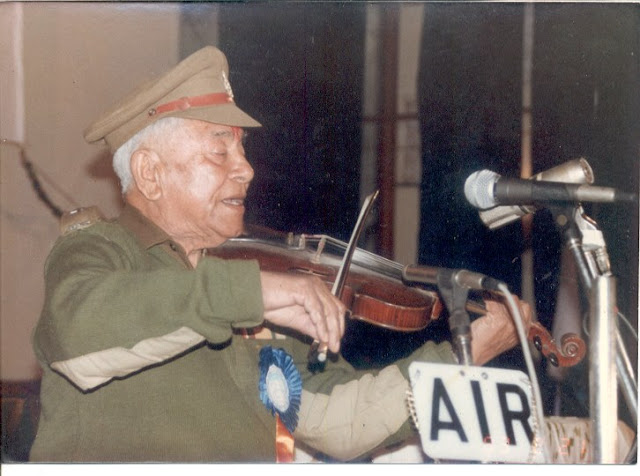Captain Ram Singh Thakuri, (15 August 1914 – 15 April 2002), was an Indian Gorkha freedom fighter. Indian National Anthem was written by Rabidra nath tagore and the marching tone which we sing today was given by Capt. Ram Singh thakuri of 1 Gorkha Rifles. Captain Ram Singh Thakuri also composed a number of patriotic songs including Kadam Kadam Badaye Ja and Subh Sukh Chain and healso composed the current band-version of the Indian national anthem, Jana Gana Mana.
After independence Ram Singh was recruited in the 3rd Battalion PAC at Lucknow Uttar Pradesh in 1948, and later was promoted as the Band Master in the Rank of Inspector. Thakur retired in 1974. Upon retirement he was accorded the honorary rank of DSP. He was known as "DSP Band UP Police" at the time of his retirement. He was honoured by the Central Government, as well as the Governments of Uttar Pradesh and Sikkim.
 |
| Indian Gorkha Freedom Fighter Captain Ram Singh Thakuri |
Ram Singh was born in the North Indian in Khanyara near Dharamsala on August 15, 1914.Since he had an interest in music, after completing school in 1922, Singh joined the 1st Gorkha Rifles as a recruit in the band.He was trained trained in classical and western music as well as ballad, brass band, string band and dance band.
While in British Indian Army before independence, he won King George VI medal from the British Indian Army and got promoted in 1941 to Company Havildar Major.After the Fall of Singapore, the Japanese forces took a large number of PoWs. Of these, a large number volunteered to join the Indian National Army. Singh, who had initially not volunteered, was sent to Japan, where he met Netaji Subhash Chandra Bose. Singh later joined the Indian National Army as it was reorganised under the leadership of Bose. Subhas Chandra Bose was instrumental in tapping the talent of Captain Ram Singh as a dedicated music director. On his personal request, Singh composed the tunes for Kadam Kadam Badaye Ja, the INA's marching song and now a noted patriotic song from India. He also composed the tune for Subh Sukh Chain (or the Qaumi Tarana as it was known), the National Anthem to be adopted by Azad Hind. In 1944, Capt. Ram Singh was decorated by Subhas Chandra Bose for his contributions. Singh also received a violin and a saxophone as gifts from Bose.
Over his long career, Captain Ram Singh earned a number of awards. These included:
- George VI Medal, 1937
- Netaji Gold Medal(Azad Hind), 1943
- Uttar Pradesh 1st Governor Gold Medal, 1956
- President Police Medal, 1972
- UP Sangeet Natak Akademi (UP Music and Drama Academy) Award, 1979
- Sikkim Government Mitrasen Award, 1993
- The First Azad Hind Fauj Award by the West Bengal Government in 1996
After the end of the war, as the INA surrendered in Rangoon, Singh was shipped back to India with his fellow soldiers. Imprisoned at the Kabul Lines of the Delhi Cantonment, Singh was released later as most of the INA troops were released without charge. Singh and members of his orchestra band were invited to play the National Anthem on the occasion of the Prime Minister's inaugural address to the nation at the Red Fort.
 |
| This photo of Captain Ram Singh Thakuri was taken by Feroz Sultan of Kalimpong when Capt had come to Gangtok during early 90s. |
Captain Singh's final years were difficult and controversial.He was initially denied the status of a freedom fighter by the government.A controversial court petition at one point sought to establish that he was not the composer of the National Anthem.He suffered an epilepsy attack in 2001, and after suffering ill health for nearly a year, died on 15 April 2002.He was cremated with State honours at Bhaisakund. However the State Government of Uttar Pradesh was again criticised for the absence of notable or prominent Government officials save a few police officers.





+Avinash+Gurung+at+the+Gorkha+Rangamanch+Bhavan+in+Darjeeling+on+Saturday;+Bimal+and+Asha+Gurung+in+the+audience.+Pictures+by+Suman+Tamang.jpg)
Post a Comment